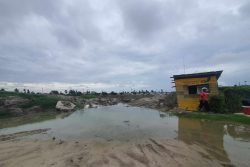Civil society group Article 13 yesterday raised grave concerns over the price tag for the Amaila Falls Hydro Power project and it blistered the government over the overwhelming foreign domination of the recent energy expo here.
Article 13 which was formed last year says it is not satisfied about the wisdom of pursuing the Amaila project with all its costly risks.
It flayed the awarding of a construction contract without simultaneously entering a Power Purchase Agreement as putting the cart before the horse.
“We are satisfied too that a price being bandied about by Mr. Winston Brassington does not include all the costs and that Guyana and the Guyana Power & Light Inc. will be incurring significant additional costs, other than the nominal price tag.
“Article 13 recalls that the earlier Amaila project was highly criticised for its price tag. This new version is not much different. Ethiopia two days ago opened a 5,000 MW hydro project at a cost of US$4,200 million or US$840,000 per MW. Guyana will be paying US$750 million for 165 MW, a unit cost of US$4.5 million per MW, or 5.3 times that of Ethiopia.
“Let us look at this another way. At a BOOT (Build, Own, Operate and Transfer) price of US$750 million, the operator will have to recover some US$37.5 million per annum, exclusive of any interest, operating cost and profits. And of course, the deal will be sweetened by the full range of tax concessions, including a 20-year tax holiday on income, property, withholding and quite possibly employee taxes as well. And whether we utilize the power or not, we will have to pay for every unit produced”, Article 13 lamented.
The group which counts commentators Christopher Ram and Yog Mahadeo among its members also took aim at the gas to shore project that the government is proceeding with.
“Article 13 is not satisfied that the Gas-to-Shore project is consistent with the (2016) Petroleum Agreement, but is satisfied that the announcement that the arrangements for the cost of building the pipeline will be treated as recoverable from oil proceeds is evidence that the Government does not take ringfencing very seriously”, the group said.
It was only last year that the government announced that this gas project will be financed from the cost oil. This is a major change in the fundamentals of the 2016 Production Sharing Agreement where only the cost of oil production was supposed to be catered for by cost oil.
Article 13 also rapped the government over the four-day International Energy Conference and Expo held last week.
“It is unclear who the Organisers are, with the only hint being a message by Anthony J. White as Chairman of the Expo. It is unclear too, whether the decision not to invite any opposition parliamentarian, academic or member of civil society to participate in the few panel discussions, let alone as one of the more than fifty persons who addressed the Conference, was that of the Government, the opaque organisers, or both. The absence at the higher level of Trinidad, with their century of experience in the oil and gas sector, could not escape attention.
“It was a feel-good conference. The foreigners who constituted the majority of the delegates must have left Guyana with the impression that there was total national consensus on all things oil, and that Guyana was heading to become the Dubai of the Caribbean. They could not be more wrong. The Exxon Petroleum Agreement, the sector’s regulatory framework, the country’s environmental capacity and oversight, the mega-projects, and steps in place to prevent the Dutch Disease and the more damaging Resource Curse, are issues which the Government seems willing to leave to chance or treat as low priority”, Article 13 declared.
There was also a mild rebuke for Barbadian Prime Minister Mia Mottley. Article 13 said that while the presentation of the PM was well delivered and her defence of Guyana’s right to promote local content firm and eloquent, “she was more subdued on the issue of climate change and its threat to low-lying states such as Guyana, than she was in Glasgow a few months ago”.
Article 13 called on the Government to have a domestic version of the Conference but with the word Conference replaced by Consultation.
“It is entirely unacceptable that Guyanese had to learn from a prohibitively priced international conference, an additional trickle of information on the Government’s Gas-to-Shore and Amaila Falls Hydro projects”, the group said.







